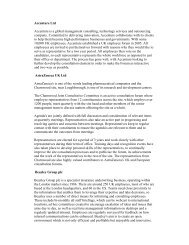Public Policy: Using Market-Based Approaches - Department for ...
Public Policy: Using Market-Based Approaches - Department for ...
Public Policy: Using Market-Based Approaches - Department for ...
Create successful ePaper yourself
Turn your PDF publications into a flip-book with our unique Google optimized e-Paper software.
<strong>Public</strong> <strong>Policy</strong>: <strong>Using</strong> <strong>Market</strong>-<strong>Based</strong> <strong>Approaches</strong><br />
observe that whilst competition does reduce the price of these contracts, quality<br />
is maintained or even enhanced. They there<strong>for</strong>e conclude that the effect of<br />
competition is greater on price than quality and the influence of ownership<br />
negligible on both.<br />
Ways to reduce the quality incomplete contracts problem<br />
The single best way to minimise the problems posed by incomplete contracts is<br />
to ensure that the initial contract is as ‘complete’ as possible, and to ensure that<br />
the resulting contract can be effectively monitored and en<strong>for</strong>ced. In some of the<br />
cases reviewed in the literature, where private firms have reduced quality, the<br />
problem has been one of lack of monitoring and en<strong>for</strong>cement of contract<br />
provisions rather than incompleteness per se. Domberger and Jensen (1997)<br />
note that one example of quality reduction, at the Esmore Correctional Services<br />
Corporation at Elizabeth detention centre in New Jersey, USA, which resulted in<br />
a riot in 1995, was actually a problem of contract en<strong>for</strong>cement. In that case the<br />
terms of the contract were broken as the prison guards lacked the necessary<br />
qualifications to per<strong>for</strong>m their role.<br />
Moreover, evidence suggests that monitoring is not particularly costly. The UK<br />
Audit Commission (1995) finds that contract monitoring costs amount to no<br />
more than a few percent of the contract price. 201 Although a number of studies<br />
have found evidence of such quality shading (reduced quality that meets<br />
contract requirements) (e.g. Cope, (1995) and Evatt Research Centre (1990)), 202<br />
this is generally considered preventable through the use of proper contract<br />
design (Domberger and Jensen, 1997) as long as appropriate monitoring and<br />
en<strong>for</strong>cement mechanisms are in place.<br />
However, even if all per<strong>for</strong>mance measures cannot be adequately specified, it<br />
may be possible to assess the overall quality of the service received when the<br />
contract comes up <strong>for</strong> renewal. If reducing quality adversely affects the possibility<br />
of a provider having the contract renewed, then this can provide a strong<br />
incentive to maintain quality, even when quality cannot be completely specified.<br />
Another means to prevent quality shading is by multi-sourcing, as this allows <strong>for</strong><br />
‘yardstick competition’ through the benchmarking of suppliers against one<br />
another. The threat of moving demand from poor to high per<strong>for</strong>ming suppliers<br />
deters suppliers from cutting quality during the life of the contract, and provides<br />
incentives to exceed contractual requirements. This effect <strong>for</strong>med the rationale<br />
behind the multi-sourcing approach adopted by the NHS <strong>for</strong> its National<br />
Programme <strong>for</strong> IT, which committed to selecting at least three different suppliers<br />
<strong>for</strong> its regional contracts and actually chose four.<br />
201 See Audit Commission (1995) Making markets: a review of the audits of the chief role <strong>for</strong> contracted services.<br />
March 1995, London, HMSO.<br />
202 Cope, S. 1995. Contracting-out in local government: cutting by privatising. <strong>Public</strong> <strong>Policy</strong> and Administration 10(3).<br />
Evatt Research Centre. 1990. Breach of Contract: Privatisation and the Management of the Australian Local<br />
Government. Pluto Press: Sydney.<br />
180
















